Essential Guide to Hormones: Practical Ways to Optimize in 2025

Understanding Hormonal Acne: Causes, Symptoms, and Effective Treatment Options
Hormonal acne is a skin condition that affects many individuals, particularly during puberty, menstruation, pregnancy, and menopause. It arises from hormonal changes that lead to excess oil production and clogged pores. Understanding the underlying causes of hormonal acne is crucial for effective treatment and prevention. This article provides a comprehensive overview of hormonal acne, covering its symptoms, triggers, and the most effective treatments available.
We will also delve into the connection between acne and diet, the role of stress in flare-ups, and essential skin care practices tailored for acne-prone skin. By the end of this article, you'll have a clearer understanding of how to manage hormonal acne and maintain healthy skin.
Essential Facts About Hormonal Acne and Its Causes
Hormonal acne typically appears around the jawline, chin, and cheeks, and it's often characterized by deep cystic lesions that can be painful. The increase in androgen levels, which occurs during puberty and hormonal fluctuations, can result in the overproduction of sebum. This excess oil combined with dead skin cells can block hair follicles, leading to acne breakouts.
Understanding Hormonal Changes and Acne
Hormonal changes, particularly during the menstrual cycle, can trigger acne flare-ups. For many women, this is due to rising levels of progesterone, which can cause increased oiliness of the skin. This oiliness can result in blocked pores and subsequent acne outbreaks. Puberty and hormonal changes that accompany pregnancy and menopause also significantly contribute to the occurrence of hormonal acne.
Diet and Hormonal Imbalances
The relationship between diet and hormonal acne is an important aspect to consider. Some studies suggest that diets high in refined sugars and dairy products may contribute to hormonal imbalances, leading to skin issues. Maintaining a balanced diet rich in antioxidants, healthy fats, and hydration can support skin health and potentially minimize acne flare-ups.
Image: 
Environmental Factors and Hormonal Acne
Environmental factors such as pollution, humidity, and exposure to certain chemicals can exacerbate acne conditions. It’s vital to evaluate your surroundings and lifestyle choices to identify possible acne triggers. Implementing lifestyle changes, like regular cleansing and the use of non-comedogenic products, can greatly improve skin quality.
Common Symptoms and Types of Hormonal Acne
Identifying the symptoms associated with hormonal acne can assist in early intervention and effective treatment. Symptoms may vary but often include painful cystic bumps, frequent pustules, and inflammation predominantly around the chin and jawline area.
Recognizing Acne Symptoms Early
Awareness of your skin's behavior is critical in managing hormonal acne. Keeping a journal of flare-ups can help pinpoint when and why they occur. Common symptoms include redness, swelling, and the presence of inflamed lumps. Understanding your unique skin type—whether oily, dry, or combination—also plays a crucial role in tailoring an effective skincare routine.
Types of Hormonal Acne
There are several types of acne, each requiring specific treatment approaches. Hormonal acne can present as cystic acne, which is deep and painful, or as papules and pustules that are more common and surface level. Recognizing the differences between these types can help in selecting the right treatment products.
Image: 
Effective Treatments for Hormonal Acne
Treating hormonal acne often requires a multifaceted approach. The use of appropriate acne medications, lifestyle changes, and specialized skincare routines can significantly improve outcomes.
Utilizing Acne Medications
Over-the-counter treatments, such as salicylic acid, can be effective in managing hormonal acne. This ingredient helps to exfoliate the skin and clear out clogged pores. For more severe cases, dermatologists may prescribe topical retinoids or hormones that can significantly reduce acne severity. Always seek professional advice to determine the best course of action tailored for your skin type.
Skincare Routine for Acne-Prone Skin
Implementing a consistent skincare routine is essential for managing hormonal acne. This includes using gentle cleansers, non-comedogenic moisturizers, and regular exfoliation. The aim is to maintain skin balance without adding further irritation. Avoid products with harsh chemicals that can exacerbate acne. Focus on hydrating the skin and ensuring that you minimize pore blockage.
Lifestyle Changes and Their Impact on Acne
Making strategic lifestyle changes can also aid in preventing hormonal acne flare-ups. These include managing stress through techniques like yoga or meditation, ensuring sufficient sleep, and maintaining regular hydration. Understanding the impacts of stress and sleep on skin health opens a pathway to manage acne more effectively.
Preventive Measures and Management Strategies
Preventing hormonal acne involves understanding its triggers and taking proactive measures. This includes learning about the various factors that contribute to acne and implementing strategies that can mitigate these effects.
Avoiding Common Acne Triggers
It's important to identify and avoid common triggers such as certain food items—especially dairy products and high-glycemic-index foods—which can cause hormonal fluctuations. Keeping track of your diet and how it impacts your skin can be beneficial in developing a personalized plan.
Acne Clarity Tips
Finding clarity in the steps to manage hormonal acne can help individuals create an effective routine. Regularly assess your products for efficacy; what works for one person may not work for another. Educating yourself about acne and skin health can empower you in making informed decisions about your skincare products and routines.
Q&A: Common Questions About Hormonal Acne
What Causes Hormonal Acne?
Hormonal acne is mainly caused by hormonal fluctuations that increase oil production in the skin, block pores, and create a perfect environment for acne bacteria. This can be influenced by menstrual cycles, stress, diet, and other hormonal imbalances.
Can Diet Affect Hormonal Acne?
Yes, your diet can play a significant role in the severity of hormonal acne. Foods with high sugar levels, dairy, and processed items can contribute to acne flare-ups. Focusing on a balanced diet rich in nutrients may help improve your skin condition.
How Do I Choose the Right Acne Medication?
Choosing the right acne medication should be based on your specific skin needs. It's always recommended to consult with a dermatologist to help you determine suitable over-the-counter products or require prescription medications for better control of hormonal acne.
Are There Effective Home Remedies for Hormonal Acne?
Some home remedies may help alleviate mild symptoms or outbreaks. Common treatments include using tea tree oil, aloe vera, and apple cider vinegar. However, consult with a healthcare professional to ensure these are safe for your skin type.
Is Hormonal Acne Permanent?
While hormonal acne can be persistent, especially in certain age groups, it is often not permanent. With proper treatment and management strategies, individuals can control and reduce their acne symptoms effectively.